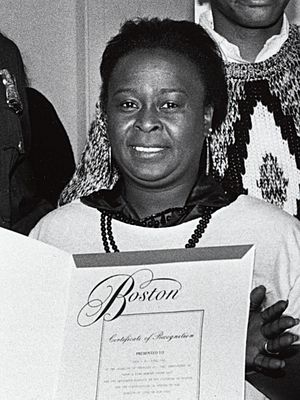Georgette Watson facts for kids
Quick facts for kids
Georgette Watson
|
|
|---|---|

Georgette Watson, pictured c. 1984-1987
|
|
| Born | 1943/1944 Philadelphia, Pennsylvania, U.S.
|
| Died | August 29, 2008 (aged 64) |
| Education | University of Massachusetts Boston (B.A.) Antioch University (M.Ed.) |
| Occupation | Anti-crime activist |
| Known for | Drop-a-Dime |
Georgette Watson (born around 1944 – August 29, 2008) was an American activist. She worked to make communities safer and helped people.
Contents
Early Life and Education
Georgette Watson was born in Philadelphia, Pennsylvania. She lived in several cities during her life. These included New York, Boston, Massachusetts, and Baltimore, Maryland. She raised three children as a single parent. Around 1980, she married James O'Connor.
Watson was a dedicated student. She earned a bachelor's degree from the University of Massachusetts Boston. She also received a special certificate to work as a paralegal. This means she was trained to help lawyers. Later, she earned a master's degree from Antioch University. In 1991, she received an honorary doctorate from Emmanuel College. This is a special award for her achievements.
Georgette Watson passed away in Baltimore, Maryland, on August 29, 2008. She was 64 years old. She died from health problems like pneumonia and kidney disease.
Making Communities Safer
Starting Drop-a-Dime
In 1983, Georgette Watson co-founded an organization called Drop-a-Dime. She started it with Reverend Bruce H. Wall. This group aimed to fight crime. They set up a special hotline. People could call this hotline to share secret tips about crimes. These tips were then given to the Boston police and other government agencies.
The name "Drop-a-Dime" came from an old saying. "Dropping a dime" meant putting a coin into a payphone to call the police. Reverend Wall said their hotline received over 600 calls each month. These calls helped police make hundreds of arrests. In 1986, a government official named Bill Weld praised Drop-a-Dime. He said their tips helped put members of dangerous gangs in prison. The group also taught people how to gather information for the police. They also showed them how to call the police in large groups during emergencies.
Working with Police
Watson sometimes spoke out about the police. She felt that police reacted more strongly to crimes in some neighborhoods than others. She also talked about racism among Boston police officers. She noted a "cultural conflict" when police were not from the areas they patrolled. Watson believed that police needed to understand the community better. She said, "We do need police in the community. But we need police that understand the community, that culturally understand it."
In 1989, Watson received police protection 24 hours a day. This was because a criminal group reportedly offered money to harm her. Watson believed she was targeted because she supported police policies. These policies allowed police to stop and search people.
Leading a State Program
In 1991, Watson was chosen to lead the Governor's Alliance Against Drugs. In this role, she focused on preventing crime. She worked on creating programs to stop crime before it happened. She led this group for five years. She later left the position.
After leaving the state program, Watson moved to Baltimore, Maryland. She faced health challenges, including breast cancer and kidney problems. She found it hard to use public transportation to get to her dialysis appointments. She wrote letters to the transportation agency about her experiences. Later, she accepted a job with them. Her new job was to help make transportation easier for people with disabilities. She also became a teacher at the Baltimore City Community College.
Public Service and Awards
Running for Office
In 1986, Georgette Watson ran for a public office. She wanted to be the Sheriff of Suffolk County, Massachusetts. However, she was not elected. In 1990, Watson ran for a seat in the Massachusetts Senate. She lost this election by a small number of votes.
Special Recognition
Georgette Watson received many awards for her work. In 1987, Essence magazine honored her for her community service. In 1990, the Federal Bureau of Investigation (FBI) and the Drug Enforcement Administration (DEA) gave her a community leadership award. Watson was also one of the first people to receive a Points of Light award. This award was given by President George H. W. Bush.

